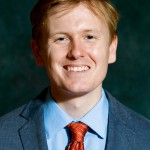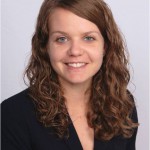 Kevin Bisceglia is an Assistant Professor of Chemistry at Hofstra University. He earned a B.S. and M.E. in Environmental Engineering from Manhattan College, and a Ph.D. in Environmental Engineering and Chemistry from Johns Hopkins University. His research interests include environmental analytical chemistry, water quality, and chemical fate and transport in the built environment.
Kevin Bisceglia is an Assistant Professor of Chemistry at Hofstra University. He earned a B.S. and M.E. in Environmental Engineering from Manhattan College, and a Ph.D. in Environmental Engineering and Chemistry from Johns Hopkins University. His research interests include environmental analytical chemistry, water quality, and chemical fate and transport in the built environment.

Nicole Fahrenfeld is an Assistant Professor in Civil and Environmental Engineering at Rutgers, The State University of New Jersey. She received her Ph.D. in Civil Engineering with a concentration in Environmental and Water Resources Engineering from Virginia Tech. She earned her B.S. in Environmental Engineering from Johns Hopkins University and M.S. in Environmental Engineering and Science from Clemson University. Her research interests include pathogen fate and transport, microbial source tracking, bioremediation, and emerging contaminants.
Read their Emerging Investigators article ‘sewer surveillance for monitoring antibiotic use and prevalence of antibiotic resistance: urban sewer epidemiology’. It’s open access and therefore free to read.
– How has your research evolved from your first to your most recent article?
Kevin: I started off studying the redox chemistry of metals and metalloids in sediments. After that, I moved into environmental organic chemistry, studying pharmaceuticals and personal care products as contaminants. I had a fantastic opportunity to do some of my doctoral work at NIST developing methods for the determination of illicit drugs in municipal wastewater, and I’ve been fascinated with the notion of wastewater-based epidemiology ever since.
Nicole: I started research interested in environmental organic chemistry, so much so that my masters project was using chemical tracers for fecal coliform source tracking. That interest in chemical fate and transport lead me to a PhD project on munitions biodegradation. During that project I learned more about and became more interested in the microbiology driving chemical fate in the environment. Now working on antibiotic resistance, and this review in particular, is a chance to continue working at that interface of organic chemistry and microbiology for an important water quality and public health issue.
– What aspect of your work are you most excited about at the moment?
Kevin: I’m really excited about extending the practice of wastewater-based epidemiology beyond monitoring illicit drug use, into equally pressing public health concerns such as antibiotic resistance. I’ve also become interested in better understanding chemical cycling in suburban environments. Long Island, where Hofstra is located, is intimately linked with the post-war notion of suburban living, and it is home to many of the first modern American suburbs. As most Americans now live in suburban environments, a key challenge we face is how to make existing suburbs more sustainable and resilient. Luckily, there is a great cohort of people at Hofstra University attempting to do just that.
Nicole: Since joining Rutgers I’ve been enjoying the opportunity to apply my skills to urban water quality issues. NJ has high rates of de facto water reuse, legacy contaminants from our industrial past, high population density, and aging infrastructure. Environmental engineers can play a role in helping work towards improved water quality and resiliency.
– In your opinion, what is currently the biggest challenge for sewer systems?
Nicole: The age and, in regions with combined sewers, outdated design of sewers is the greatest challenge currently. No matter the approach (green or gray infrastructure), it is time to invest in upgrading these systems.
Kevin: I agree with Nicole that the biggest problem sewers face is their age and, especially in the northeastern US where Hofstra and Rutgers are located, the existence of combined sewers.
– What should the next step be to improve our understanding of processes occurring in our sewer infrastructure?
Nicole: One step would be better understanding the factors driving attenuation in these systems. Lisa Rodenburg’s lab at Rutgers did some really interesting work on persistent organic pollutant degradation in sewer systems. My lab is hoping to build on that by understanding the factors driving pathogen attenuation in these systems.
Kevin: I’d recommend pilot scale studies to better understand sewers as biochemical reactors and as a unique ecological niche. I’m closely following work by Nicole, Lisa Rodenberg, and others to better understand chemical and microbial dynamics in sewer systems.
– What do you find most challenging about your research?
Kevin: Keeping my analytical instruments running, and convincing public health researchers to consider municipal wastewater as a resource for surveilling public health. There has been some interest in doing so in the EU, but far less in the United States.
Nicole: It is an exciting time with the ability to generate –omics data sets and move towards systems level understandings of environmental processes. But, piecing these large data sets together and figuring out what they really means in these complex systems is certainly a new challenge.
– In which upcoming conference or events may our readers meet you?
Nicole: We’ll be presenting our research on end-of-pipe treatment for combined sewer overflow effluent at WEFTEC.
Kevin: I’m planning to be at the national ACS conference this spring.
– How do you spend your spare time?
Nicole: Running, sailing, hiking, at the shore and with my family.
Kevin: With my children, aged 5 and 7. I try to get outdoors whenever possible, whether to NYC or hiking, biking, kayaking along Long Island’s coastal waters
– Which profession would you choose if you were not a scientist?
Kevin: I would be a research librarian. My favorite part of doing research is fact-finding and literature review, during which you get to learn about what others have done and think about what might be possible. I’d love to do that full time.
Nicole: Probably writing. I became interested in environmental engineering in part from newspaper articles I read while volunteering at a non-profit for children’s environmental health. A well-written story can put flesh behind facts and data and make a real difference in the way a reader feels about an issue. If I wasn’t working on generating those data and facts, I think I’d enjoy telling the stories surrounding them.
– Can you share one piece of career-related advice or wisdom with other early career scientists?
Kevin: Rely on colleagues for support and guidance along the way. You may be surprised to learn how many of your peers are experiencing similar challenges. Although our field can be competitive, don’t hesitate to seek out collaborative opportunities and create a network of ‘advisers.’
Nicole:I didn’t know this was the job I’d have or the research I’d be doing when I started out. When I get the opportunity to speak to students about career paths I can empathize with the uncertainty or anxiety some express about what area they want to focus in, how/if/when they want to pursue grad school, etc. There are lots of paths to a satisfying career and a happy life. Don’t be afraid to start trying on hats to see which fits.










